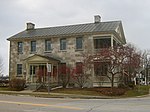Grand Isle (island)
Grand Isle, VermontIslands of Grand Isle County, VermontIslands of Lake ChamplainLake islands of VermontSouth Hero, Vermont ... and 1 more
Vermont geography stubs

Grand Isle, also known as South Hero Island, is the largest island in Lake Champlain, Vermont, United States. It has a land area of 31.61 square miles (81.9 km2). The island comprises the two towns of Grand Isle and South Hero, Vermont. The total population as of the 2000 census was 3,651.
Excerpt from the Wikipedia article Grand Isle (island) (License: CC BY-SA 3.0, Authors, Images).Grand Isle (island)
Hanson Lane,
Geographical coordinates (GPS) Address Nearby Places Show on map
Geographical coordinates (GPS)
| Latitude | Longitude |
|---|---|
| N 44.68 ° | E -73.327 ° |
Address
Hanson Lane
Hanson Lane
05458
Vermont, United States
Open on Google Maps





